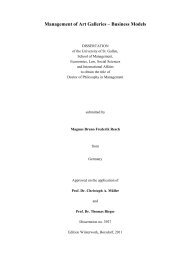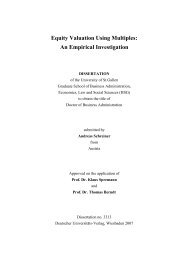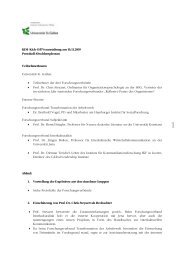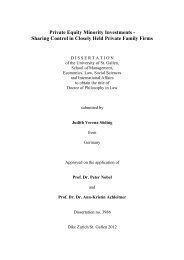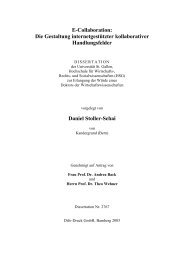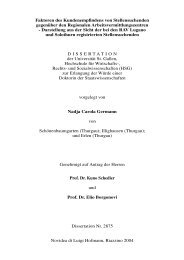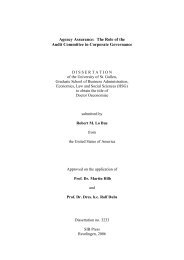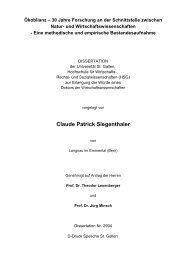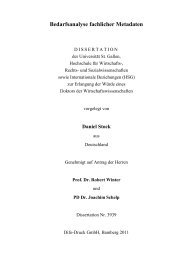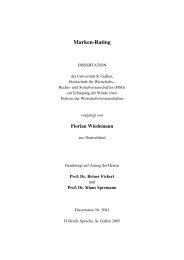The Impact of Direct Democracy on Society - Universität St.Gallen
The Impact of Direct Democracy on Society - Universität St.Gallen
The Impact of Direct Democracy on Society - Universität St.Gallen
- No tags were found...
You also want an ePaper? Increase the reach of your titles
YUMPU automatically turns print PDFs into web optimized ePapers that Google loves.
– 10 –1 Introducti<strong>on</strong><str<strong>on</strong>g>The</str<strong>on</strong>g> topic <str<strong>on</strong>g>of</str<strong>on</strong>g> this dissertati<strong>on</strong>, as its title suggests, is the societal impact <str<strong>on</strong>g>of</str<strong>on</strong>g> direct democracy,with a particular focus <strong>on</strong> Switzerland. This introductory chapter intends to shed light <strong>on</strong> thisissue by providing a brief general descripti<strong>on</strong> <str<strong>on</strong>g>of</str<strong>on</strong>g> the theoretical and empirical background andthe general scientific approach the author intends to take. More issue-specific detail and indepthinformati<strong>on</strong> will be provided in the following chapters, each <str<strong>on</strong>g>of</str<strong>on</strong>g> which is dedicated to<strong>on</strong>e aspect <str<strong>on</strong>g>of</str<strong>on</strong>g> this research problem.'<str<strong>on</strong>g>Direct</str<strong>on</strong>g> democracy', or more precisely, direct legislati<strong>on</strong>, implies the direct influence <str<strong>on</strong>g>of</str<strong>on</strong>g> thepeople <strong>on</strong> the political decisi<strong>on</strong>-making process whose outcomes gain shape in both laws anddecrees <str<strong>on</strong>g>of</str<strong>on</strong>g> the parliament. This influence means that a modern democracy, which takes placesolely through representative instituti<strong>on</strong>s <str<strong>on</strong>g>of</str<strong>on</strong>g> political decisi<strong>on</strong>-making, is complemented bydirect-democratic instituti<strong>on</strong>s. <str<strong>on</strong>g>The</str<strong>on</strong>g> decisive instituti<strong>on</strong>s <str<strong>on</strong>g>of</str<strong>on</strong>g> direct legislati<strong>on</strong> are referenda andinitiatives, which in ec<strong>on</strong>omic theory are thought <str<strong>on</strong>g>of</str<strong>on</strong>g> as influencing the political outcome infavor <str<strong>on</strong>g>of</str<strong>on</strong>g> the preferences <str<strong>on</strong>g>of</str<strong>on</strong>g> the citizenry (FELD and KIRCHGÄSSNER, 2001, BESLEY and COATE2001).'Societal impact' is a broad term that seemingly allows a huge scope <str<strong>on</strong>g>of</str<strong>on</strong>g> possible issues foranalysis. To investigate this impact, I will use the so-called social indicators that can, <strong>on</strong> the<strong>on</strong>e hand, be objectively measured but that, <strong>on</strong> the other hand, go bey<strong>on</strong>d the meremeasurement <str<strong>on</strong>g>of</str<strong>on</strong>g> financial or m<strong>on</strong>etary aspects. Fortunately, these indicators must andtherefore will be limited to those linked to public goods whose financial base for provisi<strong>on</strong> isdirectly affected by instituti<strong>on</strong>s <str<strong>on</strong>g>of</str<strong>on</strong>g> direct legislati<strong>on</strong> 1 . This approach narrows the field <str<strong>on</strong>g>of</str<strong>on</strong>g>societal impact c<strong>on</strong>siderably, in this case to the following indicators: subjective well-being <str<strong>on</strong>g>of</str<strong>on</strong>g>residents, public safety, income redistributi<strong>on</strong>, and educati<strong>on</strong>.<str<strong>on</strong>g>The</str<strong>on</strong>g> approach <str<strong>on</strong>g>of</str<strong>on</strong>g> this dissertati<strong>on</strong> is empirical and employs ec<strong>on</strong>ometric methods <str<strong>on</strong>g>of</str<strong>on</strong>g> analysis.Such systematic methods have the advantage that the resultant scientific findings will be validin a general sense, i.e. they will not be driven by single observati<strong>on</strong>s (statistical outliers) asmight occur if a purely verbal-descriptive case study approach were chosen.1 In the case <str<strong>on</strong>g>of</str<strong>on</strong>g> Switzerland, these are typically those public goods provided by Swiss cant<strong>on</strong>s in fields that enjoya high degree <str<strong>on</strong>g>of</str<strong>on</strong>g> political and financial aut<strong>on</strong>omy (see also the discussi<strong>on</strong> in chapter VI <strong>on</strong> educati<strong>on</strong>). Suchfields are especially police, educati<strong>on</strong>, culture, and welfare.



